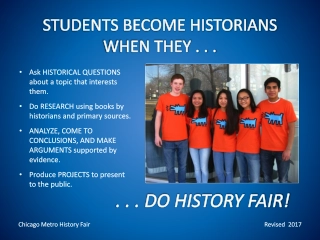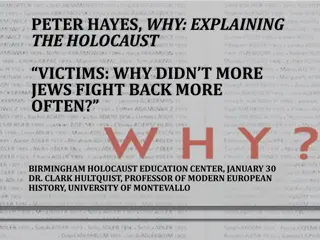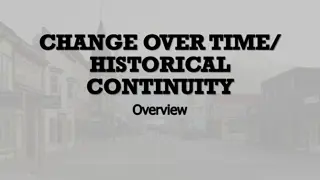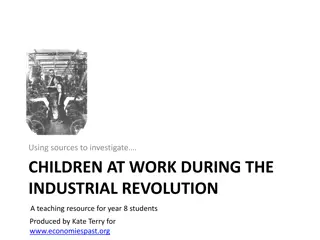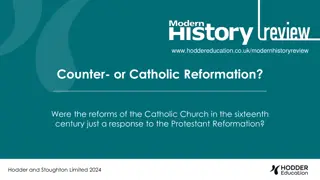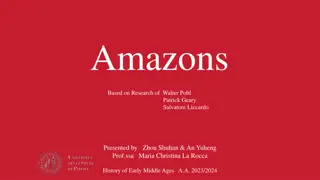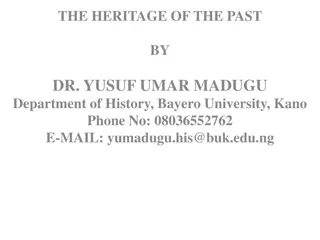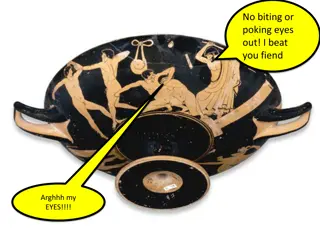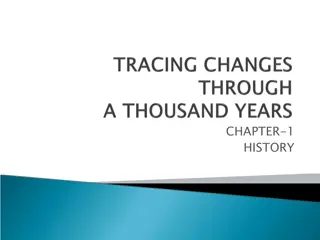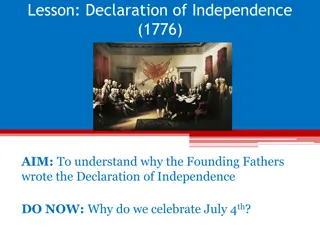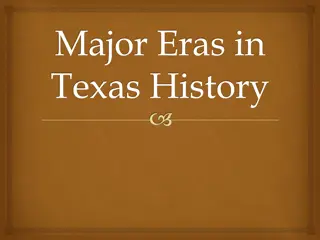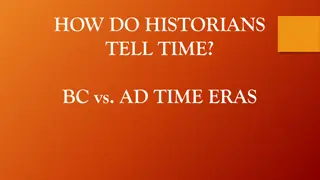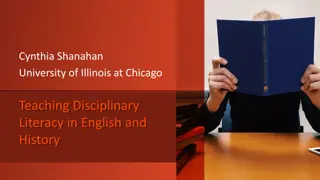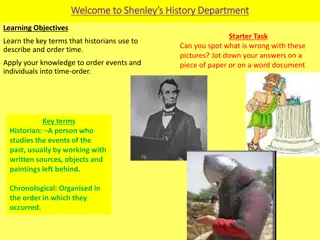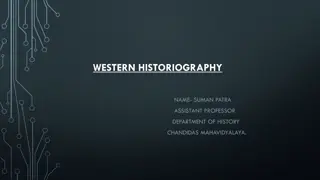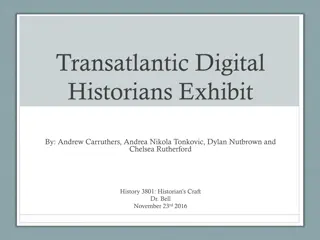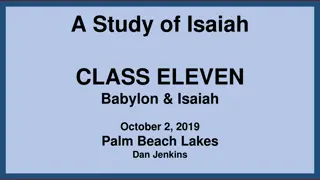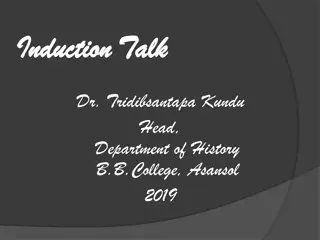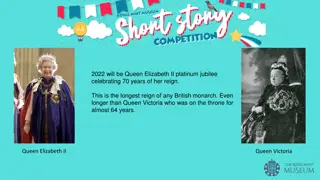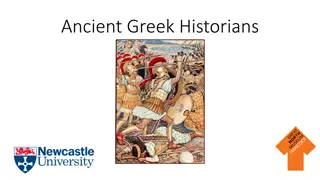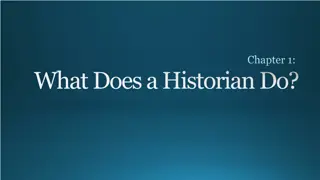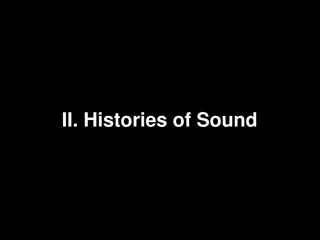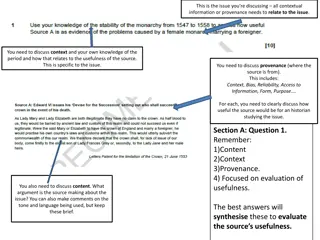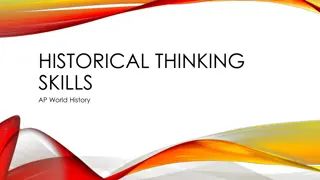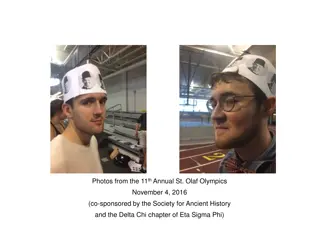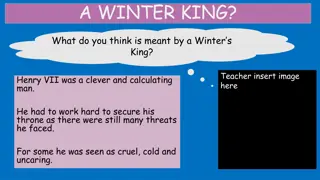. . . DO HISTORY FAIR!
Students become historians when they dive into historical questions, conduct research using credible sources, analyze data, and present their findings through projects. History Fairs offer a transformative experience where students evolve into museum curators, documentary filmmakers, scholars, websi
2 views • 86 slides
Germanic Tribes and Languages in History
Delve into the ancient Germanic tribes and languages, their territories, movements during the Migration Period, surviving languages, writing systems, and encounters with prominent historical figures like Roman generals. Learn about the earliest mentions of Germans by Greek travelers and astronomers,
3 views • 35 slides
Resistance and Compliance in the Holocaust
Exploring the complex dynamics of why more Jews didn't fight back during the Holocaust, this content delves into the notions of compliance, resistance, and the harsh realities faced by the victims. Through the perspectives of historians such as Raul Hilberg and Yehuda Bauer, it examines the challeng
6 views • 11 slides
Insights into Energy Transition Research and Historical Perspectives
Explore the intersection of energy transition research with historical perspectives, focusing on the importance of just transitions and the evolving relationship between history and sociology. The discussion delves into key concepts like distributive justice, the role of historians and sociologists,
9 views • 8 slides
Historical Continuity and Change Over Time
Explore the concepts of historical continuity and change over time to understand how different processes in history evolve. Historians study how topics have evolved from one period to another, recognizing both change and continuity. Discover examples and insights into these concepts through real-wor
5 views • 8 slides
CHILDREN AT WORK DURING THE INDUSTRIAL REVOLUTION
Explore the types of work children did during the Industrial Revolution from 1851-1901. Learn about available sources for historians, such as census records, church registers, school logs, newspapers, photographs, poetry, and government reports. Discover how the 1851 census in England and Wales prov
2 views • 20 slides
Counter- or Catholic Reformation?
The debate surrounding the Catholic Reformation questions whether it was a self-initiated response to internal factors or a reaction to the Protestant Reformation. Historians differ on when reform truly began, with some arguing it started before Luther. Key questions include whether the Catholic Chu
0 views • 18 slides
Myth of the Amazons: A Journey through Ancient Epics
Delve into the intriguing world of the Amazons, fierce female warriors of ancient Greek mythology. Uncover their portrayal in epic poems like the Iliad and the Argonautica, and follow their legendary feats in battles alongside heroes like Achilles. Discover how early historians like Herodotus situat
1 views • 35 slides
The Transformation of Hitler: From Nobody to Somebody
Explore the events that shaped Adolf Hitler's rise from obscurity to power, including his early life, experiences in World War I, and the societal conditions that influenced his path. Delve into insights from historians like Richard Evans, Ian Kershaw, and William L. Shirer to understand the key tur
0 views • 10 slides
Heritage and History: Importance and Sources
Delve into the significance of heritage and history, exploring the valuable legacy passed down by our ancestors. Discover the role of historians in preserving our past and the diverse sources that unlock the secrets of bygone eras. Gain insights into the emergence of states and their governance, ref
0 views • 12 slides
Ancient Olympics: A Glimpse into Ancient Sporting Traditions
Explore the world of the ancient Olympics, where Greek athletes competed in events like running, chariot racing, discus, and more. Discover the significance of Olympia, the rewards for victors, and intriguing facts about the games that have captivated historians for centuries.
0 views • 9 slides
Historical Developments from 700 to 1750
The study of history between 700 and 1750 presents a vast array of challenges due to the diverse technological advancements, cultural shifts, and societal changes that occurred during this period. Historians rely on a variety of sources, such as coins, inscriptions, and manuscripts, to understand th
0 views • 11 slides
The Declaration of Independence and Colonial Perspectives
Explore the significance of the Declaration of Independence written by Thomas Jefferson and the differing perspectives of historians on the motivation behind the American Revolution. Learn about the ideological origins and beliefs of the colonists, their fears of tyranny under British rule, and the
7 views • 19 slides
Eras of Texas History
Historians divide Texas history into 12 eras to identify cause and effect in major events. The eras range from Prehistory to Early Statehood, covering the interactions between Native Americans, Europeans, and colonial powers like Spain and Mexico. Each era represents crucial developments in Texas’
0 views • 14 slides
Historical Timelines: BC vs AD Time Eras
Explore how historians tell time using BC and AD eras, learn about chronological order of significant dates, and test your knowledge with a chronological order quiz.
0 views • 4 slides
Historians' Reading Strategies in Disciplinary Literacy
Exploring how historians read through strategies like sourcing, contextualization, corroboration, and frameworks of interpretation, connecting history and English in terms of narrative elements, imagination, and societal factors.
2 views • 110 slides
Chronology in Historical Studies
Delve into the world of historical studies by learning about key terms like chronology and anachronism. Discover how historians organize events in chronological order and differentiate between periods like BC, AD, and eras. Enhance your understanding of time ordering in history through engaging acti
0 views • 10 slides
Perspectives on History, Power, and Leadership
Explore the interconnected realms of history, power dynamics, and leadership through thought-provoking discussions on who writes history, the significance of diverse perspectives, and the defining traits of effective leadership. Reflect on the role of knowledge as a form of power, the impact of poin
0 views • 8 slides
Evolution of Historiography: From Ancient Greece to Medieval Times
Explore the evolution of historiography from the ancient Greek historians like Herodotus, Thucydides, and Xenophon to Roman historians like Polybius and Livy. Discover how medieval historiography in the Middle Ages shifted towards chronicling events with less focus on separating fact from fiction.
2 views • 20 slides
Historical Research Methods
Historians delve into the past by examining evidence found in primary and secondary sources. They decipher point of view, evaluate sources for trustworthiness, and draw conclusions to write about historical events. This process involves analyzing evidence meticulously to accurately portray the past.
0 views • 10 slides
Transatlantic Digital Historians Exhibit
Explore the "Transatlantic Digital Historians Exhibit" showcasing objects like the Harris family heirlooms, including a porcelain dish, an oil lamp, and a luxurious hairbrush from their world tour in Japan. Learn about the history and craftsmanship behind these artifacts, offering a glimpse into the
0 views • 21 slides
The Importance of Babylon in the Bible: A Historical Study
Exploring the significance of Babylon throughout the Bible, this study delves into its role as a tool of God's vengeance against various nations, including Tyre and Jerusalem. It highlights Babylon's rise and fall, with insights from ancient descriptions by historians like Herodotus. The narrative u
0 views • 19 slides
Greek and Roman Historians and Early Historic India
Delve into the world of Greek and Roman historians such as Herodotus, Thucydides, Livy, and Tacitus, analyzing their methods of historical inquiry and writing. Discover the vibrant past of early historic India up to the 6th century B.C., exploring diverse cultural traditions and archaeological sourc
0 views • 14 slides
Celebrating Queen Elizabeth II's 70-Year Reign: A Jubilee to Remember
In 2022, Queen Elizabeth II marks her platinum jubilee, celebrating 70 years on the throne, surpassing even Queen Victoria's reign. Explore the significance of coronations, street parties, and the ever-changing landscape of her reign. Imagine being monarch for a day, share historical perspectives, o
0 views • 4 slides
Insights into Ancient Greek Historians: Herodotus and Thucydides
Delve into the pioneering work of ancient Greek historians like Herodotus and Thucydides, who laid the foundation for writing history as a study of real past events. Explore their unique perspectives on preserving the fame of significant achievements and documenting historical events, including the
0 views • 10 slides
The Importance of Understanding History: What Historians Do
History is the study of the past to comprehend the present and make informed decisions for the future. Historians analyze causes, measure time, divide history into periods, and track events using different calendars. The evolution from the Julian to the Gregorian calendar is explored, along with the
0 views • 12 slides
Key Arguments in Historical Investigation
Delve into the primary and secondary sources used in historical research, outlining challenging aspects and intriguing surprises encountered while preparing the investigation. Uncover the key arguments put forth by historians and prioritize next steps in the writing process.
0 views • 7 slides
Histories of Sound Through Listening and Aural History
Delve into the fascinating world of aural history and the significance of listening in understanding the past. From the fusion of sound and technology to the evolution of acoustic archives, historians are now embarking on a journey to interpret history through the unique lens of auditory experiences
0 views • 31 slides
Evaluating Sources on Female Rule in the 1550s
This analysis focuses on assessing the reliability and usefulness of historical sources discussing the issue of female rule in the 1550s. It evaluates the content, provenance, and context of the sources to determine their relevance for historians studying the topic. The sources provide insights into
0 views • 8 slides
Developing Historical Thinking Skills in AP World History
AP History classes aim to cultivate apprentice historians by fostering historical thinking skills (HTS). These skills include Chronological Reasoning, Comparison and Contextualization, Crafting Historical Arguments, and Historical Interpretation. Each skill set equips students with the ability to an
0 views • 15 slides
Highlights from the 11th Annual St. Olaf Olympics Event
Capturing moments from the 11th Annual St. Olaf Olympics event featuring various contests like the Prose and Poetry Declamation Contests, Discus and Javelin Throws, Camera Case Throw, Spartan Relay Race, Stylish Suits of Armor, and more. Witness the competitive spirit and camaraderie among classicis
0 views • 16 slides
Henry VII: A Winter King Analysis and Review
Delve into the intriguing portrayal of Henry VII as a "Winter King," examining the perspectives of historians and assessing his reign through timelines and strengths/weaknesses analysis. Explore the nuanced characteristics of this clever and calculating ruler who faced numerous challenges and contro
0 views • 6 slides
